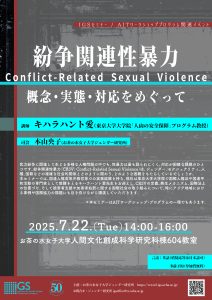 2025.7.22 IGS Seminar “Conflict-Related Sexual Violence: Regarding Concepts, Realities and Responses”
2025.7.22 IGS Seminar “Conflict-Related Sexual Violence: Regarding Concepts, Realities and Responses”
A lecture was held on the concept, reality and responses to Conflict-Related Sexual Violence (CRSV), inviting Professor Ai Kihara-Hunt, an expert in International Human Rights Law (HRL) and UN peacekeeping operations, who has extensive and practical experience in post-conflict countries such as Timor-Leste and Nepal.
As her approach is to start with “human stories,” despite uncomfortability in some descriptions, she expands an example. One case from Timor-Leste involved a 15-year-old-girl who testified about sexual violence by an Indonesian soldier, who claimed it was consensual. The court ruled the perpetrator should marry her and provide financial support. After the soldier returned to his country, the survivor faced long-term consequences of being ignored by her community and isolated due to pregnancy. This case illustrates how underage girls are subjected to sexual violence, structurally patriarchal traditional justice systems that devalue victims’ narratives, and the lasting aftermath of the harm. Professor stressed how complex discussions around “consent” can be, especially when trying to uphold survivors’ dignity.
Professor Kihara-Hunt emphasized that CRSV is not incidental, but a deliberate weapon of war used to discriminate and achieve strategic goals like weakening enemies and terrorizing communities, impacting all ages, genders and sexual orientations. In the case of women, pregnancies often reveal the violence they experienced, while male survivors are not only overlooked but also find it difficult to acknowledge their experiences due to conflict with traditional notions of masculinity, sometimes leading their exclusion from the community.
Further explanation was given about sexual violence in HRL and international humanitarian law (IHL). Under HRL, states have the following obligations regarding sexual violence: to establish appropriate legislation, to educate and train government officials, to investigate acts of sexual violence, and to protect victims and pursue justice. IHL, which applies during armed conflicts is more directly connected to CRSV. Under the IHL the use of sexual violence as means of warfare or as form of punishment is prohibited in all scenarios, and individuals who commit such violence are subject to prosecution.
However, Professor Kihara-Hunt emphasized that preventing CRSV requires more than just legal forms; it demands the establishment of a “culture of prevention” to combat the prevalent culture of impunity. Quoting Pramila Patten, a UN Special Representative, she emphasized the following three pillars. 1. Shifting from a culture of impunity to a culture of justice and accountability. 2. A survivor-centered, state-led and sustainable response. 3. Eliminating structural gender inequality and discrimination.
During Q&A, a question was raised about applying the CRSV framework to the “comfort women” system. Professor noted both involve structural violence and collevtive prepetration, but CRSV focuses on root causes and impunity, whereas “comfort women” discussions often center on reparations. CSRV is typically defined within armed conflict. However, similar patterns of sexual violence appear in militarized and tense contexts such as in Okinawa near US forces, or in economic imperialist development projects. Though not legally classified as ‘armed conflict,’ the seminar concluded by affirming that they share fundamental issues with CRSV, particularly in the lack of accountability and the persistence of impunity.
Nanami Samejima (University of Tokyo Faculty of Law, Department III Political Studies)
|
《Event Details》 |

